Nearly a fifth of people in Blackburn have tested positive for Covid since the pandemic began, official figures show.
The Lancashire authority has been the worst hit area in the UK, recording 12 times more cases per population size than the least affected parts of the UK.
Department of Health data shows around 19,000 per 100,000 people in Blackburn have had the virus since March 2020, compared to just 1,500 in the Orkney Islands in Scotland.
Burnley — also in Lancashire — was the second worst affected region in the UK, with the virus infecting just under 18 per cent of people. It was followed by Knowsley in Merseyside (17.9 per cent), Hyndburn in Lancashire (17.0 per cent) and Derry City and Strabane in Northern Ireland (16.8 per cent).
Covid was least prevalent in remote island and coastal areas of Scotland, Wales and England. After the Orkney Islands, the Shetland Islands — the northernmost part of the UK — had the next lowest case rate, with 2.9 per cent of people testing positive.
It was followed by Comhairle nan Eilean Siar in Wales (3.1 per cent), Moray in northeast Scotland (4.2 per cent) and North Norfolk (5.2 per cent).
More broadly, the figures highlight how northern parts of England — which are typically the most deprived — have borne the brunt of the crisis.
Blackburn initially became the country’s hotspot last summer and was put into a local lockdown to curb rising cases. Its outbreak was believed to have been the result of lower adherence to social distancing in deprived and hard-to-reach ethnic minority groups.
Case rates surged once again in the area when the Delta variant ripped through the population back in May. The strain was imported in high numbers into the country via travellers returning from India.
Experts told MailOnline the true proportion of people who contracted the disease will be even higher because of a lack of testing, particularly in the first wave, and asymptomatic spread. Only 8million people have officially tested positive for the virus since the pandemic began.
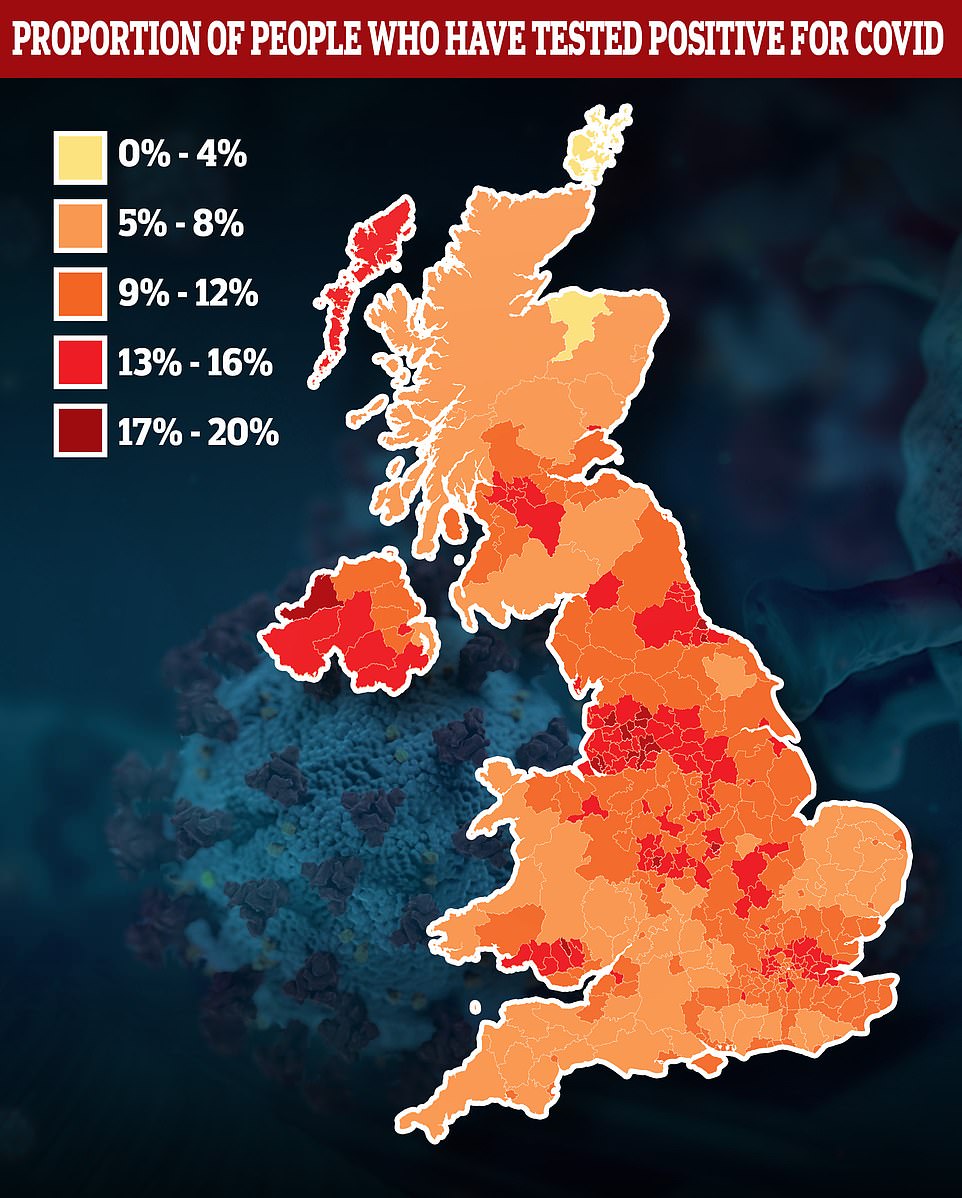
Nearly a fifth of people in Blackburn have tested positive for Covid since the pandemic began, official figures show. Map shows: The proportion of people who have tested positive in each local authority in the UK
10 MOST AFFECTED AREAS
AREA
Blackburn with Darwen
Burnley
Knowsley
Hyndburn
Derry City and Strabane
Middlesbrough
Hartlepool
Oldham
Pendle
Merthyr Tydfil
% of pop who had Covid
19.2 per cent
18.0 per cent
17.9 per cent
17.0 per cent
16.8 per cent
16.7 per cent
16.5 per cent
16.5 per cent
16.4 per cent
16.3 per cent
Advertisement 10 LEAST AFFECTED AREAS
AREA
Orkney Islands
Shetland Islands
Comhairle nan Eilean Siar
Moray
North Norfolk
Highland
Ceredigion
Torridge
West Devon
Pembrokeshire
% of pop who had Covid
1.5 per cent
2.9 per cent
3.1 per cent
4.2 per cent
5.2 per cent
5.6 per cent
5.9 per cent
6.0 per cent
6.1 per cent
6.5 per cent
Advertisement 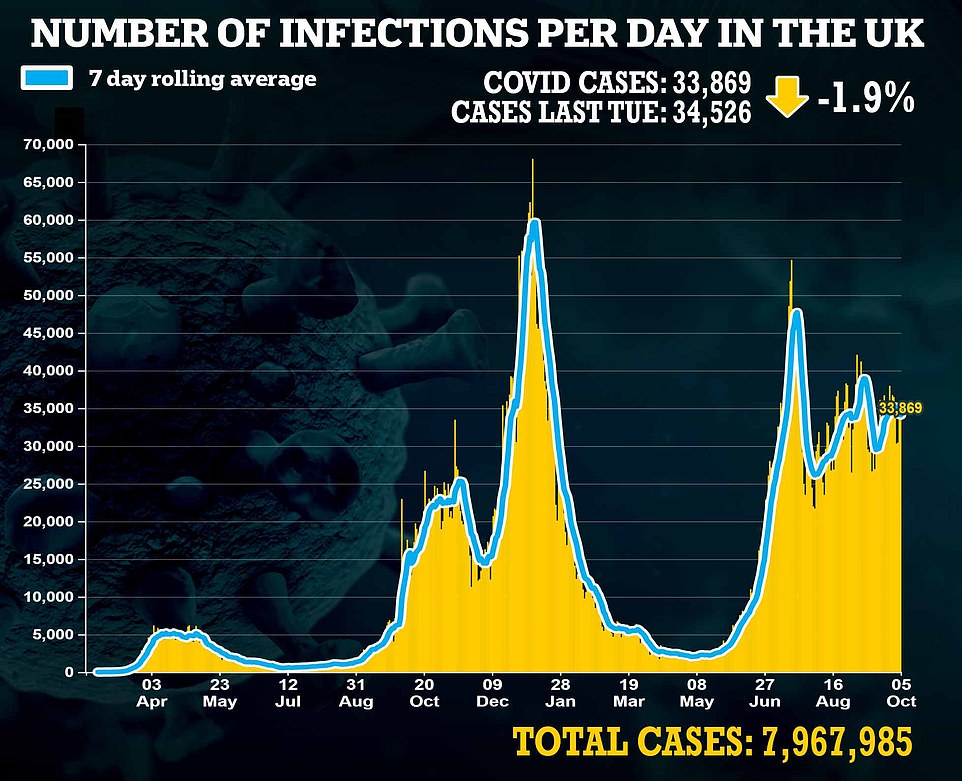
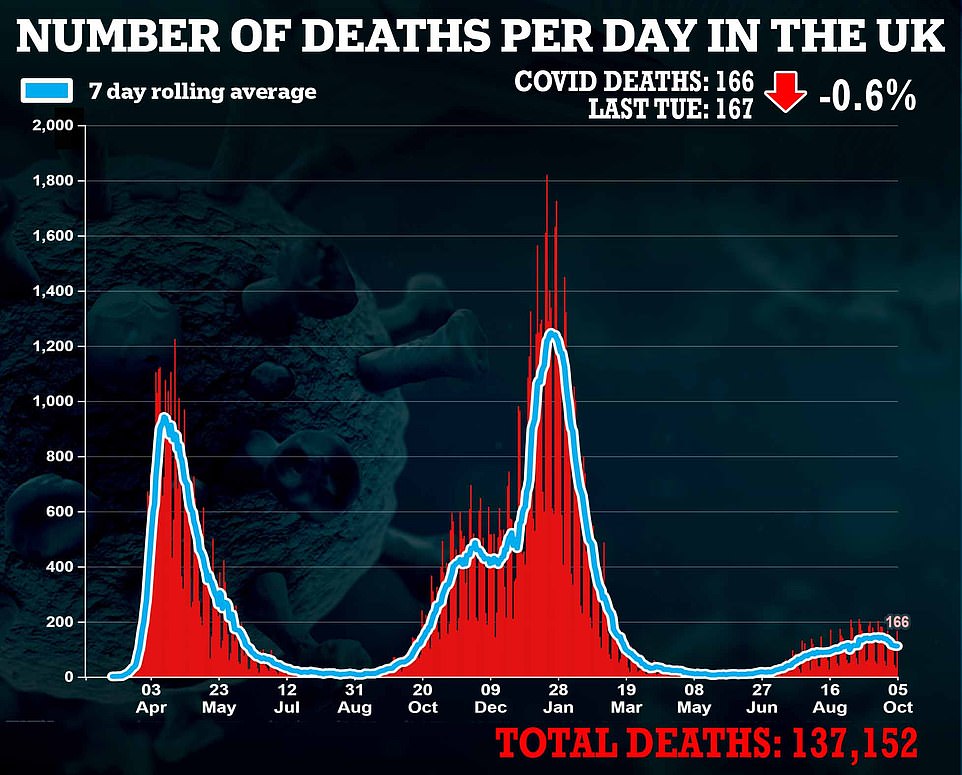
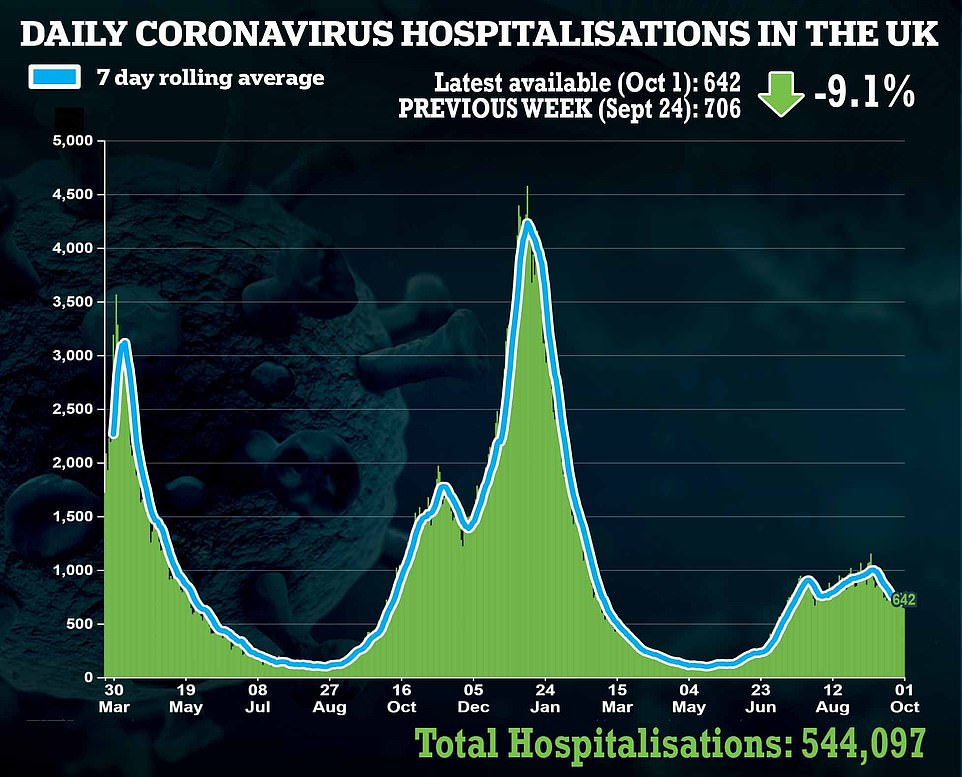
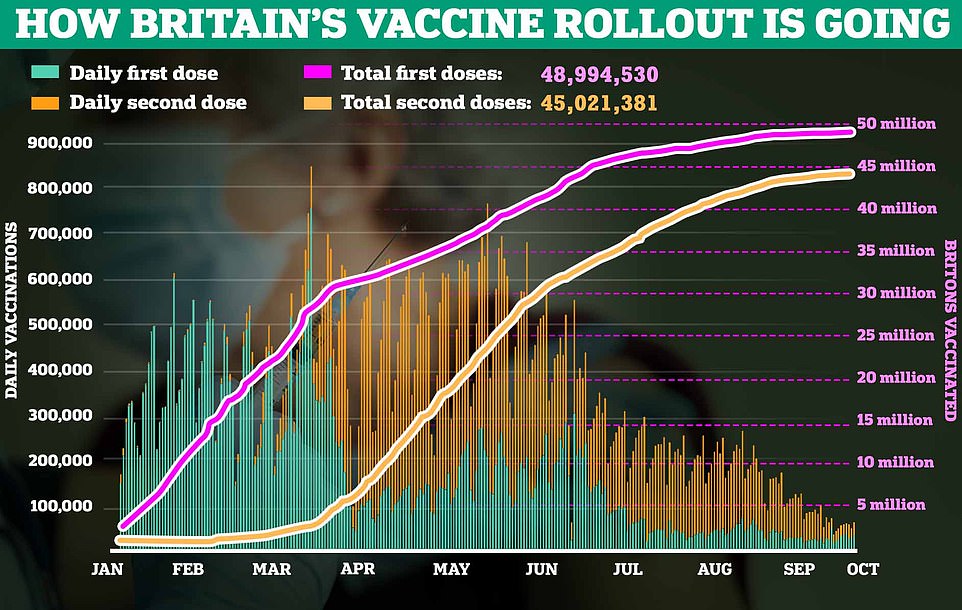
Professor Lockdown says ministers may need to resort to winter Covid ‘Plan B’ if daily admissions breach just 1,200
England may have to resort to its winter Covid ‘Plan B’ if daily hospital admissions for coronavirus breach 1,200, ‘Professor Lockdown’ Neil Ferguson said today.
Boris Johnson announced last month that face masks, social distancing and vaccine passports might need to be brought back if the NHS comes under unsustainable pressure.
Ministers said the trigger point will be hospital rates now that the jabs have made case numbers less important — but they have not put a threshold on admissions.
Professor Ferguson — a key Government adviser whose modelling prompted the first lockdown last March — suggested England should not tolerate more than 1,200 daily hospitalisations. For comparison, Covid admission levels breached 4,000 during the darkest days of the second wave in January.
Speaking to a cross-party committee of MPs today, he said that the country was currently recording around 600 Covid admissions per day.
He added: ‘If that figure were to double, we’d need to think about moving to “Plan B”.’ The epidemiologist, based at Imperial College London, called for ‘more intense’ curbs if there is a sharp rise in admissions.
To get ahead of a winter wave, he said second doses for 16 and 17-year-olds could be brought forward and advised we are ‘more aggressive’ in administering boosters.
Advertisement
Professor Christina Pagel, a mathematician at University College London, said the highest case rates have been seen across the most deprived communities in Britain, which has then translated into more severe and deadly disease.
She told MailOnline: ‘The true number of infections will be much higher than 20 per cent of the population, since many people who had Covid would not have been tested —especially in the first wave.
‘The general pattern we’ve seen is that more deprived communities have been exposed to Covid with far higher case rates over the pandemic than the least deprived communities.
‘This is due to a combination of factors: more working outside the home, more working in crowded or public facing jobs — for example factories, hospitality, security guards, transport — more likely to live in overcrowded and multigenerational housing, less access to green spaces.
She added: ‘Then, once infected, people from more deprived communities also more likely to get need hospital, more likely to die and more likely to develop Long Covid.
‘With high case rates, children from deprived communities have missed more school and also been less able to study well at home.
‘So the whole situation this pandemic has been to put most of the burden of Covid on more deprived communities and made existing health and other inequalities much worse.’
But Professor David Livermore, a microbiologist at the University of East Anglia, told MailOnline that while there was a clear pattern in which areas of the country had the highest case rates, this was not necessarily reflected in data on deaths.
He said: ‘Six of the ten highest case rates are for local authorities in North West England, with Blackburn with Darwen highest.
‘Five of these North West six — Blackburn with Darwen, Burnley, Hyndburn, Oldham and Pendle — are in what I think of as the “South Lancashire Valleys”, which is notable geographic clustering.
‘South West England, by contrast, generally has low rates as, unsurprisingly, do remote parts of Scotland, such as the Orkneys.
‘However, and critically, only one of the “North West six” — Burnley — is in the top 10 for deaths, along with one more — Merthyr Tydfil in Wales — from the whole top 10. Blackburn with Darwen is only about the 25th highest for deaths.’

ENGLAND CASES: The number of people testing positive for Covid in England has levelled off over the past fortnight, after breaching 50,000 a day in July. Rates were highest in January, when the Alpha variant took off

ENGLAND DEATHS: The number of people dying from coronavirus every day in England now stands at about 80, and has been falling over the past few weeks. Fatalities breached 1,000 in the first wave last April, and 1,500 in the second wave in January
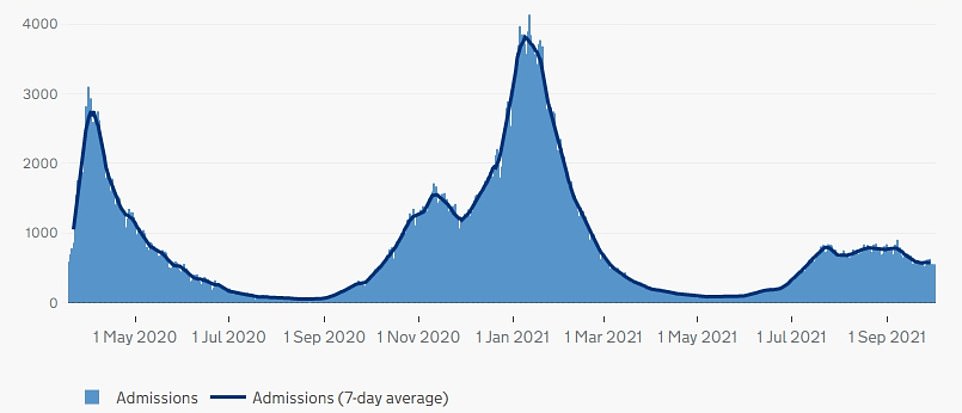
ENGLAND’S COVID HOSPITAL ADMISSIONS (SINCE THE PANDEMIC BEGAN): The number of Covid hospitalisations in England peaked during the second wave in January, when daily levels breached 4,000
Thousands of users slam ‘chaotic and shambolic’ rollout of Scotland’s £600,000 vaccine passport
Users have blasted the ‘chaotic’ and farcical rollout of Scotland’s controversial vaccine passport scheme, as Nicola Sturgeon was forced into a grovelling apology over its tumultuous launch.
The First Minister said she was sorry for the ‘deeply regrettable’ problems, which left thousands of Scots unable to access their vaccination status just hours before new restrictions came into effect on Friday, October 1.
However, she pointed the blame at the NHS for the issues rather than the new £600,000 app, and claimed high demand had crippled the new system.
Those attending large events and nightclubs in Scotland are now required to show proof they have had two doses of vaccine using the app before they are allowed in.
Speaking at the Scottish parliament in Holyrood, Miss Sturgeon said that information ‘wasn’t being sent quickly enough from the NHS system to the app’.
Admitting that this had caused ‘extreme frustration’, she said: ‘I apologise for that.’
Advertisement
He added: ‘As ever with Covid, danger arises not from the total number of infections but from who is being infected.
‘Blackburn with Darwen’s 19,000 per 100,000 case rate hasn’t translated into an excess of deaths.
‘Perhaps a lot of the infections there, and in the North West six generally, were in children or young adults, who rarely suffer severe illness. [Government data] suggests this, particularly for the second wave.
‘By the third wave most of the middle aged and elderly had some protection from vaccines and infections everywhere were concentrated in younger, lower risk, populations.’
Cases rates are counted once per person and include children, Public Health England said.
It comes as ministers were warned the UK is ‘much closer to the limit of what the NHS can cope with’ due to the ongoing high number of Covid cases.
Experts told All-Party Parliamentary Group (APPG) on Coronavirus other countries are in a more favourable position than the UK is heading into winter.
Professor Martin McKee warned that ‘the NHS is at much greater risk of being overwhelmed than other countries because we have much less capacity’.
And Professor ‘Lockdown’ Neil Ferguson went on to add that ‘we can’t afford to have too much of a winter surge before the NHS is very heavily stressed’.
Dr Jonathan Cylus explained how countries in Europe with a similar vaccination level to the UK were taking similar more stringent approaches to control cases from rising, such as ‘maintaining restrictions’,
He said ‘there’s not so much of a strategy’ in the UK, which is following a ‘wait-and-see type of approach’.
Professor Kate Ardern stressed the precariousness of this method, cautioning that ‘it would not take much, in terms of increases in Covid cases over the next few weeks and months, for the system to tip’ adding that she thinks ‘a very challenging winter’ may lie ahead for the UK.
Layla Moran MP, Chair of the All-Party Parliamentary Group on Coronavirus, said: ‘The high number of cases we continue to see in the UK was not inevitable, but is a direct result of the government lifting restrictions too soon.
‘While the UK vaccination programme has been brilliantly executed by the NHS, we are now starting to lag behind and it is clear that we still face a challenging winter ahead.
‘It is critical that Ministers learn from past mistakes, and act proactively to ensure the NHS is not at risk of being overwhelmed again, to avoid the undoing of our hard won freedoms as we head into winter.’
Source link : https://www.dailymail.co.uk/news/article-10064173/Up-FIFTH-people-Blackburn-tested-positive-Covid-pandemic-began.html











